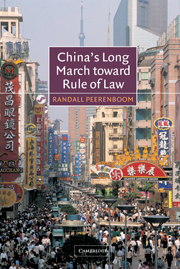Book contents
- Frontmatter
- Contents
- Preface
- List of abbreviations
- 1 Introduction
- 2 The evolution of rule of law in China: the role of law in historical context
- 3 Post-Mao reforms: competing conceptions of rule of law
- 4 Rule of law and its critics
- 5 Retreat of the Party and the state
- 6 The legislative system: battling chaos
- 7 The judiciary: in search of independence, authority, and competence
- 8 The legal profession: the quest for independence and professionalism
- 9 The administrative law regime: reining in an unruly bureaucracy
- 10 Rule of law and economic development
- 11 Rule of law, democracy, and human rights
- 12 Conclusion: the future of legal reform
- References
- Index
3 - Post-Mao reforms: competing conceptions of rule of law
Published online by Cambridge University Press: 20 July 2009
- Frontmatter
- Contents
- Preface
- List of abbreviations
- 1 Introduction
- 2 The evolution of rule of law in China: the role of law in historical context
- 3 Post-Mao reforms: competing conceptions of rule of law
- 4 Rule of law and its critics
- 5 Retreat of the Party and the state
- 6 The legislative system: battling chaos
- 7 The judiciary: in search of independence, authority, and competence
- 8 The legal profession: the quest for independence and professionalism
- 9 The administrative law regime: reining in an unruly bureaucracy
- 10 Rule of law and economic development
- 11 Rule of law, democracy, and human rights
- 12 Conclusion: the future of legal reform
- References
- Index
Summary
With the death of Mao in 1976, China began to steer a new course. Many Party leaders, having suffered personally and severely from the arbitrary and lawless acts of Red Guards during the Cultural Revolution, were eager to advocate greater reliance on law as a means of preventing the reoccurrence of such policy-driven excesses. In addition, legal reforms were seen as a way for the Party, whose image had been badly tarnished, to regain legitimacy both domestically and abroad.
Most importantly, however, Deng Xiaoping and other leaders decided that the major problem confronting China was not class struggle but economic growth. China was declared to be in the primary stages of socialism.Before China could reach the hallowed ideal of a communist society, it would first have to pass through a capitalist phase. One of Mao's mistakes was to try to leapfrog over the capitalist stage. Accordingly, Deng announced that to get rich was glorious and threw open the doors to foreign investment. The success of the reforms, and especially China's ability to attract foreign investment, hinged on improvements to the legal system and greater reliance on law. “A market economy is a rule of law economy” became the rallying cry. At the most basic level, law is necessary to create and maintain a modern market: to establish property rights and a contract regime; ensure market equality and maintain market order by protecting against fraud, unfair competition, and monopoly; separate government from enterprises; establish and regulate financial and capital markets; and so on.
- Type
- Chapter
- Information
- China's Long March toward Rule of Law , pp. 55 - 125Publisher: Cambridge University PressPrint publication year: 2002



